|
|
|
Sort Order |
|
|
|
Items / Page
|
|
|
|
|
|
|
| Srl | Item |
| 1 |
ID:
097066
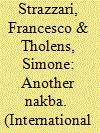

|
|
|
|
|
| Publication |
2010.
|
| Summary/Abstract |
Violent clashes of June 2007 saw Hamas ousting Fatah from the Gaza Strip, thereby making patent the existence of a deep politico-military split within the Palestinian national movement. This article sheds light on the present face of the conflict in the Palestinian territories by adopting a historical-analytical perspective that emphasizes the role played by the availability of small arms and light weapons, as one of the many structural factors that underlie the transformation of the Palestinian struggle. Aware of the essentially contestable and reductionist nature of this endeavor, the authors examine the way in which the weapons acquisition process has changed in the time period from the beginning of the first Intifada in 1987 to the Gaza take-over by Hamas, 20 years later. In doing this, they extend the applicability of existing theories about the correspondence between access to weapons and the changing nature of insurgency, so to better understand a complex case where a national struggle has been spiralling into internecine violence and splintering, in what we may call "another Palestinian Nakba."
|
|
|
|
|
|
|
|
|
|
|
|
|
|
|
|
| 2 |
ID:
171676
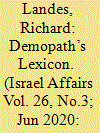

|
|
|
|
|
| Summary/Abstract |
This article examines a double discourse by the Palestinian leadership, one in English and one in Arabic, which plays a central role in their negotiating strategy with Israel since the onset of the Oslo ‘peace process’ (1993). Using language very close to Western terminology, Palestinians in English speak of ‘Occupation’ and ‘Settlements’ with the 1967 borders as the defining issue; while in Arabic, they speak of ‘Occupation’ and ‘Settlements’ in terms of the 1948 borders (i.e., all of Israel is an ‘Occupation’ and Tel Aviv is an illegal ‘settlement’). As a zero-sum negotiating strategy this makes perfect sense: convince Israel to concede ‘land for peace’ (1967 borders), when in reality this means ‘land for war’ (1967 borders as launching pad for war to 1948 borders). The western news media, allegedly committed to accurate reporting, shows no knowledge of the Arabic discourse and presents what Palestinians say in English as reliable reflections of their actions and intentions. As a result of this failure to identify the double-discourse, the Western legacy media presents Palestinian war propaganda as news to their Western audiences, unwittingly helping the Palestinians in their deception.
|
|
|
|
|
|
|
|
|
|
|
|
|
|
|
|
| 3 |
ID:
096185
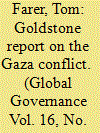

|
|
|
|
|
| Publication |
2010.
|
| Summary/Abstract |
By concluding that, in its assault on Gaza under the rubric of self-defense, Israel had targeted the civilian infrastructure and consciously "punished" the civilian population and demonstrated indifference to the suffering of noncombatants and engaged in other acts in violation of the laws of war, behaviors that possibly constituted in their totality crimes against humanity, the Goldstone Report became almost as controversial as the events precipitating it. In this agora, four eminent international lawyers, a mix of scholars and practitioners, assess from their distinctive perspectives the report's methodology, its compliance with fact-finding norms, and the overall quality of its effort to apply norms of international law to a bloody event in the ongoing multidecade conflict between Jews and Arabs over the governance and division of the former British-controlled Palestinian Mandate. Dialectically, they help to structure future debates over UN-sponsored fact-finding and also the normative parameters of the use of force by powerful states engaged in asymmetrical conflicts.
|
|
|
|
|
|
|
|
|
|
|
|
|
|
|
|
| 4 |
ID:
111725
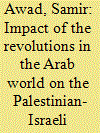

|
|
|
|
|
| Publication |
2012.
|
| Summary/Abstract |
To what extent does the "Arab Spring" influence the Palestinian-Israeli conflict?
Many turbulent events are currently affecting the Palestinian and Arab sphere, starting with the American position against Palestine's bid for statehood at the United Nations Security Council, and their defeating a proposal against Israeli settlement expansion. As a matter of fact, this was another expression of the well-known American stand consistently biased in favor of Israel.
This means that the Americans have lost their position as an honest interlocutor between the Palestinian and the Israelis.
Huge changes are evolving in the Arab World as a whole in view of the popular uprisings in Tunisia, Egypt, Libya, Yemen and Syria. The Palestinian situation does not differ much from that of other Arab peoples and regimes, despite the fact that it has been defined by their major confrontation with the Israeli occupation. This does not mean that the experiences of the neighboring Arab people will pass without affecting Palestine, entailing demands for more freedoms, democracy and fighting against corruption. It is worth noting that the Arab Spring uprisings did not point at all to the Palestinian cause or the Israeli occupation, since they are more concerned with internal affairs, arranging their priorities according to the national agenda and not the external policy of the state.
|
|
|
|
|
|
|
|
|
|
|
|
|
|
|
|
| 5 |
ID:
177747
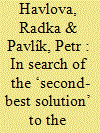

|
|
|
|
|
| Summary/Abstract |
This article presents an alternative approach to the resolution of the Palestinian-Israeli conflict. As the one-state solution is generally unacceptable to both Israel and the Palestinians and the two-state solution does not seem to be working, the authors suggest a possible ‘second-best solution’. Under this proposal a prospective Palestinian state would extend from the Gaza Strip to adjacent parts of the Sinai Peninsula for which Egypt would receive either financial or territorial compensation by the extension of its territory westwards to areas currently administered by Libya.
|
|
|
|
|
|
|
|
|
|
|
|
|
|
|
|
| 6 |
ID:
129798
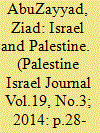

|
|
|
|
|
| Publication |
2014.
|
| Summary/Abstract |
The issue of land is at the core of the Palestinian - Israeli conflict. For a long time efforts aimed at achieving a settlement to the conflict were based on the principle of 'land for peace' meaning that if Israel withdraws from the occupied Arab territories, including the occupied Palestinian land, the Arabs will make peace with Israel.
|
|
|
|
|
|
|
|
|
|
|
|
|
|
|
|
| 7 |
ID:
097176
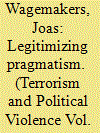

|
|
|
|
|
| Publication |
2010.
|
| Summary/Abstract |
This article shows how Hamas legitimized its policy choices during the Al-Aqsa intifada and the Gaza war. The organization's policy moved from violent during the initial stages of the uprising to more moderate during later years. While this entailed huge changes in the organization's course of action, Hamas nevertheless always managed to frame its choices in a way that seemed consistent with its long-held beliefs. The same occurred during the Gaza war, when Hamas moderated its discourse even further. This shows Hamas' flexibility and pragmatism but also that seemingly rigid ideological views can change quite dramatically when circumstances change too.
|
|
|
|
|
|
|
|
|
|
|
|
|
|
|
|
| 8 |
ID:
091788
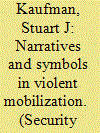

|
|
|
|
|
| Publication |
2009.
|
| Summary/Abstract |
According to symbolic politics theory, group fears and narratives of group identity that justify hostility are key causes of violent ethno-national conflict. In the Palestinian-Israeli conflict, widely accepted narratives on each side define group identity and group relations in ways that generate incompatible demands on Jerusalem, territory, refugees, security, and other issues. Historical memories of the Holocaust, the Nakba, and other tragedies generate fears of extinction on both sides, and stereotypes encourage beliefs on each side that the other responds only to force. These narratives enable hard-line leaders on both sides to manipulate emotive symbols to block compromise and escalate conflict. Thus the cause of both the failure of Palestinian-Israeli negotiations in 2000-01 and the simultaneous outbreak of the latest Palestinian-Israeli war lies in the irreconcilable demands that are rooted in each side's competing narratives of national identity.
|
|
|
|
|
|
|
|
|
|
|
|
|
|
|
|
| 9 |
ID:
110028
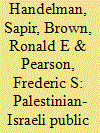

|
|
|
|
|
| Publication |
2012.
|
| Summary/Abstract |
This paper draws lessons from the role played by the black church in creating support for the US civil rights movement in relation to the struggle to involve the Palestinian and the Israeli people directly in the peacemaking efforts to resolve their tragic conflict. The civil rights struggle in both the US and South Africa eventually engaged large segments of the public in both productive debate and campaigning. The corresponding impetus now is to create a major Palestinian-Israeli public negotiating congress that can involve ordinary citizens on both sides in the peacemaking efforts. The Minds of Peace Experiment, a small-scale Palestinian-Israeli public negotiating assembly, is designed to demonstrate the peacemaking power of a subsequent major congress. The exercise, which has been conducted around the US, Canada, and the Middle East, succeeded in creating peacemaking coalitions that are based on commitment to promote the culture of peace. The question is: how can you transform this peacemaking effect into a mass movement? The American black church movement as well as the South African mass mobilization can offer important indications of effective strategy.
|
|
|
|
|
|
|
|
|
|
|
|
|
|
|
|
| 10 |
ID:
122067
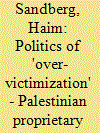

|
|
|
|
|
| Publication |
2013.
|
| Summary/Abstract |
The 'over-victimization syndrome' is a tendency to present an embellished picture of the damage caused to a party in order to enhance public support. It affects the presentation of Palestinian political claims in few contemporary actual legal proprietary issues: Israeli settlements on private Palestinian land in the West Bank, Israel's policy towards Palestinian tenants in the Sheikh Jarrah neighbourhood of East Jerusalem and the rehabilitation of the Neirab Palestinian refugee camp in Syria. The article argues that the syndrome leads to both political bias and more unnecessary suffering.
|
|
|
|
|
|
|
|
|
|
|
|
|
|
|
|
| 11 |
ID:
110032
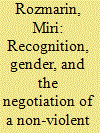

|
|
|
|
|
| Publication |
2012.
|
| Summary/Abstract |
This article examines two factors, recognition and gender, which, it is argued, need to be integrated with the MOP (Mind of Peace) model. The first section of the paper elaborates on the demand for recognition as both intersubjective and collective demand. It employs examples from one of the experiments, which took place in Beit Jala, in order to suggest how the MOP experiment might deal with these two facets of recognition. The second section of the article argues that a gendered perspective could contribute to the success of the MOP experiment. By implementing the logic of the 1325 UN Security Council resolution, and feminist scholarship, it suggests what such a gendered perspective might mean for the MOP experiment.
|
|
|
|
|
|
|
|
|
|
|
|
|
|
|
|
| 12 |
ID:
084083
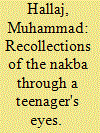

|
|
|
|
|
| Publication |
2008.
|
| Summary/Abstract |
Muhammad Hallaj, a political scientist specializing in Palestinian affairs and the Israeli-Palestinian conflict, was born in Qalqilya, Palestine, in 1932. After earning his doctorate from the University of Florida in 1966, he taught at Florida's Jacksonville University and then at the University of Jordan in Amman. Hallaj returned to the West Bank in 1975, where he served as dean of social sciences and later as academic vice president of Birzeit University before becoming the first director of the Council for Higher Education in the West Bank and Gaza. While taking a leave to go to Harvard University as a visiting scholar in 1983, Hallaj was denied a visa to return to the West Bank. Among the positions he has held since then have been editor of Palestine Perspectives (1983-1991), member (and subsequent head) of the Palestinian delegation on Refugees to themultilateral peace talks following the Madrid conference (1991-1993), and executive director of the Palestine Center and the Jerusalem Fund. At the request of JPS, Dr. Hallaj shared his memories of the 1948 war and its aftermath, which he experienced as a high school student in Jaffa, and then in Qalqilya and Tulkarm.
|
|
|
|
|
|
|
|
|
|
|
|
|
|
|
|
| 13 |
ID:
192896
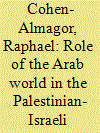

|
|
|
|
|
| Summary/Abstract |
This interview is part of a major research project that is based on interviews and discussions with influential decision-makers, facilitators, mediators and negotiators who were involved in Arab-Israeli peace negotiations over the past three decades, as well as on archival research in Oslo, London, Washington and Jerusalem. Semi-structured in-depth interviews were conducted with more than 80 Israeli, Palestinian, American, Swedish, Norwegian, Egyptian, Jordanian, British and United Nations senior officials and peace negotiators. The interviews identify the challenges and obstacles on the road to peace and suggest ways for moving forward. Prior to the interviews, interviewees signed consent forms. The interviews were audiotaped and transcribed, and the text was sent to interviewees for authorisation. The interview with Marwan Muasher – Jordan’s first ambassador to Israel (1995–6), foreign minister (2002–4), and deputy prime minister (2004–5), was held virtually on 25 July 2022.
|
|
|
|
|
|
|
|
|
|
|
|
|
|
|
|
| 14 |
ID:
081679
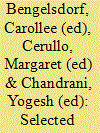

|
|
|
|
|
| Publication |
Karachi, Oxford University Press, 2006.
|
| Description |
xxiv, 619p.Hbk
|
| Standard Number |
9780195471632
|
|
|
|
|
|
|
|
|
|
|
|
Copies: C:1/I:0,R:0,Q:0
Circulation
| Accession# | Call# | Current Location | Status | Policy | Location |
| 053403 | 909.82/BEN 053403 | Main | On Shelf | General | |
|
|
|
|
|
|
|
|
|